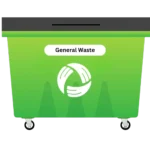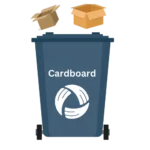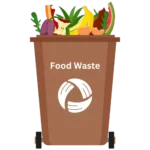Retail waste collection
Get a FAST & FREE quote for retail waste collection
Just enter your business postcode…
Get a FAST & FREE quote for retail waste collection
Just enter your business postcode…
Start saving now
Effective retail waste collection is essential for shops and stores, ensuring a clean environment, meeting waste regulations, and improving efficiency.
Whether you run a high street store, supermarket, or retail outlet, having the right commercial waste collection service in place helps keep your premises tidy and compliant.
We can help you arrange retail waste collection; simply follow these three steps to get started:

Enter your postcode above and provide a few details about your retail waste collection needs.

We’ll assess your waste requirements and provide a tailored quote based on the size and waste output of your shop.

Once you’re happy with the quote, sign your retail waste collection contract to confirm your service.
Managing retail waste requires efficiency, reliability, and expertise. We specialise in handling waste for retail businesses of all sizes. With our industry knowledge and trusted network of commercial waste providers, we make retail waste collection simple and stress-free.

We only work with reputable local waste collection providers, ensuring reliable and professional service tailored to your store’s needs.

Our experts understand the challenges of retail waste collection, from handling excess packaging to managing stockroom waste.

We manage everything from your initial enquiry to scheduling your waste collection, giving you more time to focus on running your business.
Retail businesses generate various types of waste, each requiring specific collection and recycling methods. Below are the main categories of waste produced in retail stores and how they are managed in our collection service.

General waste includes non-recyclable materials such as contaminated food packaging, mixed plastics, broken items, and other waste that cannot be recycled. This is typically collected in wheelie bins and sent for commercial waste disposal.

Commercial dry mixed recycling includes clean and uncontaminated recyclable materials such as paper, plastic bottles, aluminium cans, and food packaging. These items can be collected together and processed at a sorting facility.

Commercial cardboard waste collection is commonly produced from flattened boxes used in stock deliveries and product packaging. It is collected separately for recycling to produce new cardboard products.

Sanitary waste collection includes items from restroom facilities such as nappies, feminine hygiene products, hand towels, and disposable wipes. Learn more in our guide to sanitary waste obligations for businesses.

Commercial food waste may include expired products, spoiled goods, and unsellable fresh produce. This waste is collected separately and disposed of through composting or anaerobic digestion.

Commercial glass waste includes bottles, jars, and broken glassware from food and drink sales. Glass is infinitely recyclable and plays a key role in the circular economy. Once collected, it can be melted down and reused repeatedly without losing quality.
Retail businesses often face challenges managing packaging waste, especially with limited stockroom space. Our experts have put together practical tips to help you minimise business waste, reduce clutter, and improve efficiency.






Our tailored retail waste collection services operate nationwide, helping shops in busy city centres and retail parks manage waste efficiently and sustainably. Here are six major cities where we provide expert support:

Our London commercial waste collection service supports stores across major shopping hubs like Oxford Street, Westfield, and Camden. We handle packaging waste, cardboard, plastics, and general rubbish, keeping retail operations tidy and compliant.

Birmingham business waste collection offers tailored services for high-street stores and retail parks, including the Bullring and Grand Central. From cardboard and plastic wrap to general waste, we help retailers manage waste cost-effectively.

Our Leeds commercial waste collection, serves shops and boutiques in locations like Trinity Leeds, the Headrow, and Victoria Quarter. We manage mixed recyclables, cardboard, and packaging waste, ensuring smooth daily operations.

Coventry business waste collection covers shopping areas like West Orchards and the Lower Precinct. We provide reliable waste collection for packaging, plastics, food waste (for mixed-use stores), and general non-recyclable waste.

Our Hull commercial waste collection supports shops in St Stephen’s Shopping Centre and Princes Quay. From stockroom waste and cardboard to excess packaging, we offer efficient solutions to keep retail spaces clear and compliant.

In Rotherham, our retail waste collection service helps stores in Parkgate Shopping and the town centre. Arrange a commercial waste collection in Rotherham today for flexible and reliable collections.